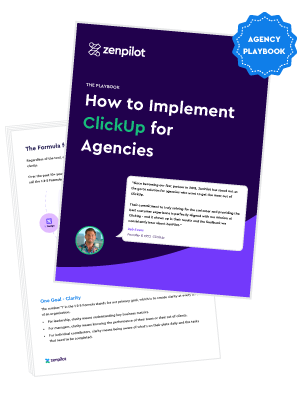How to Scale an SEO Agency to +100K a Month with Ryan Stewart
To chat with Gray and have ZenPilot lead your team through the last project management implementation you'll ever need, schedule a quick call here.
In this episode of Inbound Agency Journey, Andrew interviews Ryan Stewart from WEBRIS about corporate SEO, scaling an agency, and creating tools and training.
Ryan began digital marketing as a contractor at a large agency where he worked with big brand names. Then, he began growing his personal brand and saw the opportunity to build his own agency WEBRIS on the side. WEBRIS exploded, and Ryan currently runs the SEO agency in Miami, Florida.
Here are the main takeaways from the interview.
Scaling a Marketing Agency
Ryan has his team set up horizontally rather than vertically to help them scale. It’s an assembly-line approach. Each contractor in their process, usually someone overseas, handles one piece. For example, one contractor sets up Google Analytics and Google Tag Manager, while another finds broken links.
They can do it all batch at the start once a client signs up and then drip out the results as they go.
The other thing is his agency went deep into just SEO, rather than running SEO, Paid Ads, videos, etc. They went vertical rather than horizontal. This simplifies managing and scaling a team.
It would be best if you became confident in your process and then started handing it off to contractors when starting. Being a one-person agency isn’t scalable.
It’s a framework that keeps you organized and improves your chance to deliver results. Once you have the process figured out, you need to scale and automate it.
Having a set process helps you feel confident in delivering results for your clients.
Building Tools and Training
Most of his audience is marketers and agency owners, not potential clients. He saw there was a potential way to monetize this following. He noticed his most popular content wasn’t how-to’s as much as step by step on doing a specific process. This led to creating his White Hat Link Building Training, which covered what he was doing at his agency. The course was built to make the process easy to hand off to others.
He’s also familiar with an agency owner’s pain points and needs, and his team builds solutions to fix them.
Internally they develop tools using Google Sheets and APIs from popular tools. Sheets can become an entire project management suite and built out to be entirely customized for the agency. Clients like to know that a customized solution for their needs can be made for them.
WEBRIS will be releasing these tools as paid and free for other agencies in the upcoming months.
Corporate SEO Clients
Most agencies have their services built out for smaller businesses. With Ryan’s background, he’s been able to crack the code with corporate SEO clients. With larger companies, the focus is on fixing technical issues coupled with in-depth analytics. Unfortunately, many smaller agencies haven’t figured this out and focused only on content or link building. As a result, they’re weak in identifying technical issues.
The points of contact at corporations handle contractors and agencies and don’t do the work themselves. Corporations usually hire specialists for marketing. They’re interested in someone to specialize in, one that can deliver better results.
A specialist has more credibility than a general agency.
This is why going deep on SEO hasn’t hurt revenue at their business at all. If you have one piece that you’re very good at, you won’t risk damaging the relationships by delivering lackluster results in another service.
Finally, incorporate SEO. There is a lot of communication. This means that even when there’s not much to report, it becomes a big deal to BS with the client. With corporate clients, you need to talk on your feet, keep clients engaged, and make the relationship enjoyable.
Corporate clients also love to have customized reporting and tools for their needs. Larger agencies they’re used to working with will have high-end tools and reporting. Being able to offer this will help you stand out.
If you want to connect with Ryan, you can follow him on Twitter, Facebook, or LinkedIn.




